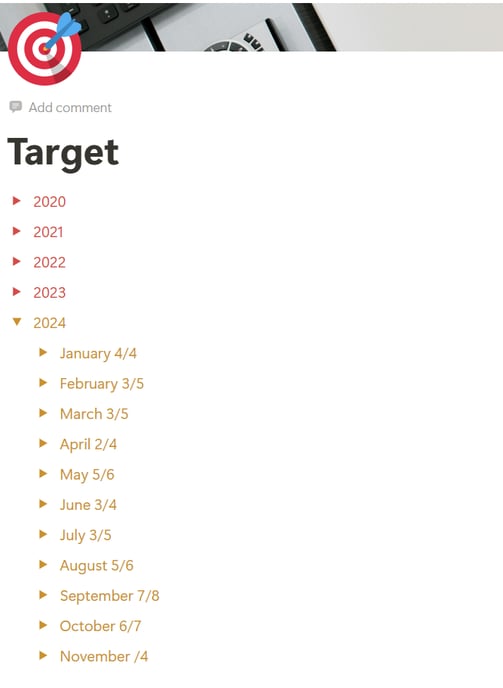November 2024
My monthly goals
I explain how this approach has changed my lifestyle


Even as a kid, I had the habit of using an agenda. In high school, for example, I would divide the pages I needed to study day by day so that I’d finish the material two or three days before a test or oral exam. That way, I could dedicate the last few days solely to reviewing. A little effort, big results (if that’s how the saying goes). It might seem like a small thing, but having everything written down helped me feel more organized and at ease because I knew I’d finish the program on time even if I only studied five pages a day and then said, "That's enough for today!". The agenda remained a constant during university as well, and this habit of planning and seeing my goals written down eventually evolved over time, leading me to more modern tools like Notion.
I discovered Notion in 2020, thanks to a video by Marcello Ascani (an Italian YouTuber). From that moment on, this tool became an integral part of my personal organization. At first, I had no idea how much it would help me, but once I created my homepage and customized everything, it felt like having my own little world tailored just for me.
The first section I decided to include was for my monthly goals. Before, I used to jot them down in the Notes app on my iPhone, but moving them to Notion allowed me to manage them in a more structured and visible way. Every month, I set goals for myself, covering a variety of areas: fitness, studies, finance, or even something as simple as spending more time reading. Over time, these goals have evolved, just as my priorities have shifted.
In my first year, my goals were much simpler than they are now and often focused on two main areas: the gym and university (classic "basic guy" stuff). I would write things like:
"I want to reach 75 kg"
"Work out every week"
"Start a cutting diet"
"Pass Analisi I exam"
Over time, though, I realized that some goals, especially the broader ones, couldn’t be achieved in just one month. They needed to be broken down into smaller, more realistic steps. For example, if I knew I had a Physics I exam in July (a tough one, by the way), I would start as early as March by adding smaller tasks to my monthly goals, such as:
“Study chapters 1–3 of the textbook”
“Complete all thermodynamics exercises”
Stuff like that. This kind of approach has helped me gradually achieve certain goals almost without realizing it.
Over time, I started setting goals that spanned across increasingly diverse areas. No longer just about the gym and university (some would say, "finally"), but covering other aspects of my life. I began organizing my priorities, aiming for one or two goals per area: fitness, university, personal finance, and self-growth.
So alongside the usual goals like "work out 12 times this month" or "pass an exam," I added ones like reading a book a month, saving a specific amount of money, or taking an online course in English or design (something I absolutely love). This variety helped me grow in a more balanced way.
Of course, I didn’t always manage to complete all the monthly goals I set. Some inevitably rolled over to the following months, and that’s okay, planning isn’t everything. Usually, I take the first day of every month to reflect and write down my goals, though on rare occasions, I add a few as the month goes on. It’s like a continuous work in progress that lets me adapt to what’s happening without feeling stuck if something doesn’t go as planned. Otherwise, I’d end up a prisoner of my own system... and, yeah, no thanks.
But wait, what exactly is Notion? Notion is a digital planner, a goal tracker, a journal, or even a collaborative workspace. Some call it the "modern Excel," but let’s say it’s more aesthetic, user-friendly, and less mechanical (don’t worry, this isn’t a sponsored post). Going back to what I was saying earlier, one goal that’s now non-negotiable for me is "happiness." It’s not a tangible goal, but every month, I ask myself, "Was I happy this month?" Before checking it off my list, I jot down the moments I remember that made me happy. Of course, not every month ends with a positive emotional balance. Some months are more complicated and challenging than others, and that’s okay, it’s part of being human. But I keep happiness as a monthly goal, knowing it’s subjective and complex, full of ups and downs. It’s not about chasing constant euphoria but about reflecting on the small, meaningful moments that add joy to my life.
Setting monthly goals, whether trivial or significant, has completely changed my lifestyle and, more importantly, my approach to things. It might seem obvious, but having everything laid out in black and white makes a real difference: whether written on a computer or jotted down in a notebook, the result is the same. When you see what you want to achieve right in front of you, it’s harder to ignore and easier to remember. In the end, that’s what it’s all about: giving yourself direction and taking it one step at a time. It doesn’t matter if you don’t hit every target within the set timeframe; even trying pushes you forward, teaches you something, and helps you improve. The key is to keep moving, to have a purpose, big or small and to work on it bit by bit.


My monthly goals
Step by step
PRODUCTIVITY
Renato Francesco Mercuri
4 min read